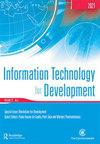布基纳法索和加纳家庭中ICT获取和使用的门槛效应
IF 5.1
3区 管理学
Q1 DEVELOPMENT STUDIES
引用次数: 8
摘要
摘要信息和通信技术在公民的个人、企业和合作生活中发挥着至关重要的作用。许多关于信通技术获取的研究往往侧重于改善信通技术获取途径的供应方;然而,在研究家庭需求方面所做的努力有限。因此,本研究通过调查家庭获得信息和通信技术的需求方,为现有文献做出了贡献。它还研究了影响家庭获得和使用信息通信技术的社会经济特征,这些特征在布基纳法索和加纳造成了“信息通信技术有”和“没有”之间的数字鸿沟。它采用了布基纳法索和加纳2014年的人口与健康调查数据来实现其目标。除其他外,研究结果强调了布基纳法索和加纳家庭在获得信息和通信技术方面的不同阈值效应。因此,为了加强家庭的信息和通信技术获取,因此,在制定信息和通信科技获取政策时,应考虑到家庭特征的使用。本文章由计算机程序翻译,如有差异,请以英文原文为准。
Threshold effects of ICT access and usage in Burkinabe and Ghanaian households
ABSTRACT Information and communication technology (ICT) has a crucial role in the individual, businesses, and cooperative lives of citizens. Many studies on ICT access tend to concentrate on the supply side of improving access to ICTs; however, limited efforts have been made to examine the households’ demand side. Thus, this study contributes to the extant literature by investigating the demand side of ICT access by households. It also examines the socioeconomic characteristics that affect the households’ access and usage of ICTs, which create a somewhat digital divide between ‘ICT have’ and ‘have not’ in Burkina Faso and Ghana. It employs Demographic and Health Survey (DHS) data for both Burkina Faso and Ghana 2014 in achieving its objectives. The results, among others, underscore different threshold effects in access to ICTs’ Burkinabe and Ghanaian households. Thus, to enhance the households’ ICT access, and consequently, usage of the features of the households should be taken into consideration when developing ICT access policies.
求助全文
通过发布文献求助,成功后即可免费获取论文全文。
去求助
来源期刊

Information Technology for Development
Multiple-
CiteScore
11.30
自引率
16.70%
发文量
34
期刊介绍:
Information Technology for Development , with an established record for publishing quality research and influencing practice, is the first journal to have explicitly addressed global information technology issues and opportunities. It publishes social and technical research on the effects of Information Technology (IT) on economic, social and human development. The objective of the Journal is to provide a forum for policy-makers, practitioners, and academics to discuss strategies and best practices, tools and techniques for ascertaining the effects of IT infrastructures in government, civil societies and the private sector, and theories and frameworks that explain the effects of IT on development. The concept of development relates to social, economic and human outcomes from the implementation of Information and Communication Technology (ICT) tools, technologies, and infrastructures. In addition to being a valuable publication in the field of information systems, Information Technology for Development is also cited in fields such as public administration, economics, and international development and business, and has a particularly large readership in international agencies connected to the Commonwealth Secretariat, United Nations, and World Bank.
 求助内容:
求助内容: 应助结果提醒方式:
应助结果提醒方式:


